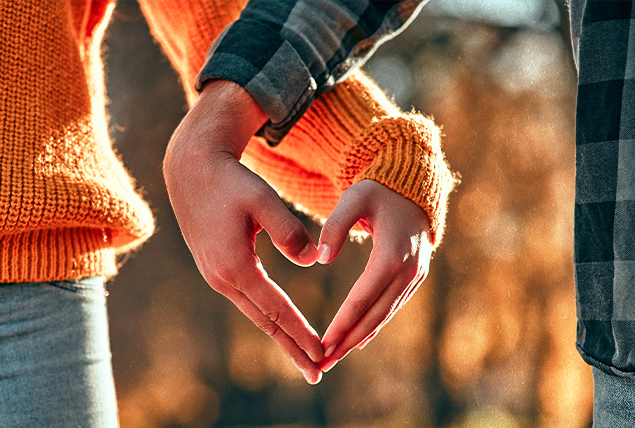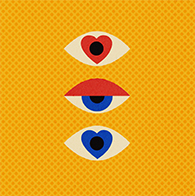The Third Love: How Many Times Do We Truly Fall in Love?

Most of us have whispers of pop culture floating around in our subconscious. Could be a rom-com quote like "You never forget your first love." Perhaps you're seeing Charlotte York on "Sex and the City" type "Everyone knows you get two great loves in your life" as she gazes thoughtfully out of her Manhattan apartment window.
Or maybe it's the raucous scene where Chris Kattan and Will Ferrell bop to "What Is Love?" in the 1998 movie "A Night at the Roxbury."
But the question keeps returning: How many times do we really, truly fall in love?
And how can we tell the difference between love, lust and attraction?
The third love?
I first saw the theory that we fall in love three times on TikTok in a popular video post by @justfirfun1219. According to this post, we fall in love with three people in our lifetime, each for a special reason.
We usually experience our first love at a young age with someone we end up growing apart from. As we get older, we imagine it wasn't really love. But you know what? It probably was.
Our second love is when we get hurt and learn lessons that make us stronger.
Finally, our third love comes blindly out of the shadows without warning. We hide nothing from them, and this is the person with whom we spend the rest of our lives.
There was no source for @justfirfun1219's post on TikTok. I did, though, track down an article published on the site Love What Matters in March 2022 that could be the original inspiration.
This theory seemed legitimate, as it perfectly describes my high school boyfriend, the guy I thought I was going to marry at 30 and the guy I actually married at 34.
This concept actually springs from the work of Helen E. Fisher Ph.D., whose study at Rutgers University defined these three "loves" as:
- Lust
- Attraction
- Attachment
Each of these types of love has its own set of hormones, which defines how we feel in these relationships.
Love, lust and attraction exist separately or in combination in the dynamic, suggested a 2013 report published by the European Molecular Biology Organization. The whole experience of love—from falling into it to falling out of it—has emotions that are biological at their core, according to Harvard Medical School.
What's love got to with it?
To understand how many times we fall in love, we should know what true love is—challenging, because the definition varies.
It's "a verb," John Mayer sang. It "hurts," according to the band Nazareth. And it's just a "second-hand emotion," Tina Turner explained.
"There is no one definition of love that is universally agreed upon," said Tino Dietrich, a relationship expert and the founder of the Dietrich Institute in Miami. "Love is a deep and genuine affection you feel for someone. It goes beyond physical attraction."
"A person's perception of what love is will change throughout their life due to the experiences we have at each developmental stage of life, along with the amount of personal reflection we do along the way in order to learn from them and understand ourselves," said Emmi Fortin, a breakup and relationship coach in the Boston area. "Many people confuse being in love with how a person or situation makes them feel."
Our first love is usually lust
The love we feel first in our lives tends to be "driven by the desire for sexual gratification," said Lilith Foxx, an online sexologist and inclusivity consultant based in Houston. "If what you're thinking is primarily sexual or intimate, it's likely lust at play."
Sometimes lust can turn codependent, as you seek and need something you lack from someone else. You tend to enter this relationship unbalanced and not ready for the long game, which is why these relationships tend to end.
"Someone who doesn't know themself as well may find they relationship-hop more, continually searching for that someone to make them feel whole or more certain about themselves," Fortin said.
First loves, or lust, tend to happen when we're researching what we want in a partner. This love doesn't only happen during our youth but also after a major life milestone such as after coming out, overcoming an illness or a divorce. We go into this stage without any preconceived ideas of what this relationship should look like.
There are no mistakes because you're discovering or rediscovering yourself, Foxx explained.
This stage tends to be immature, impulsive and exciting, noted Orna and Matthew Walters, Los Angeles-based soulmate coaches and the creators of Love On Purpose. It doesn't last, though, because it's based mostly on chemistry before we know what we truly want from life.
You might even marry this person, which could turn into a "starter marriage." This is a common result of young love.
"[Such marriages] rarely last more than a couple of years because the couple quickly discovers they don't have the communication skills to navigate conflict and that they don't really want the same things in life," Orna Walters said.
Our second love is attraction
While our first love is usually lust, our second love is attraction, which, as Foxx explained, is closely related to lust but isn't always sexual.
"The feelings can be expanded to include desire in general, as well as companionship," she said. "After we've done our research with our first love, we might have developed patterns or started to set and evaluate boundaries. This is challenging and often leads to us falling flat on our faces in this process."
She added that these lessons will lead us to a lasting healthy relationship or encourage us to take a step back and work on ourselves.
Sometimes this love can be categorized as a rebound relationship where you choose someone who's the opposite of the person who broke your heart. Sometimes people sacrifice chemistry and settle for a good friend in rebound love, according to Matthew Walters.
"This love can also be 'wounded love,' which is when your childhood trauma subconsciously drives your feelings of overwhelming attraction, ignoring the red flags of this person or not being a good match in the long term," Orna Walters said.
The third love is attachment
Our final love is when we explore who we are and discover intimacy.
"Ideally, at this point, we know what we want and what we're looking for," Foxx said. "We may have found that or have yet to find it, but you've done your research, figured out what you like and don't like. You have set and evaluated boundaries, and you are ready to create and share experiences in that space."
Attachment is where we tend to find our soulmate or lasting love because we have transitioned from the codependent tendencies of first love or lust to independence.
"At the beginning of soulmate love, you don't need your partner," Orna Walters said. "You choose a partner to share your life with. Over time, the two of you become interdependent and you've mastered the ability to turn conflict into a deeper connection."
Can you fall in love more than three times?
"There is no limit to the number of times you can fall in love," Matthew Walters said, adding that people are addicted to the chemical feeling of falling in love but struggle with the ability to create a lasting, loving partnership.
This isn't really our fault. Sex is instinctual while monogamy and marriage are social constructs.
"Long-lasting love requires a skill set (like communication and conflict resolution), as well as making conscious choices to select an ideal life partner," Orna Walters said.
"We are different people in every relationship, and just because you've loved before, still have residual feelings for an ex, or been hurt with love doesn't mean you can't love again," Foxx said.
While we commonly experience at least three types of love in our life—lust, attraction and attachment—we are not limited to experiencing each of those loves only once.
"People can fall in love multiple times throughout their lives and each experience can be unique and meaningful in its own way," Dietrich explained.




















